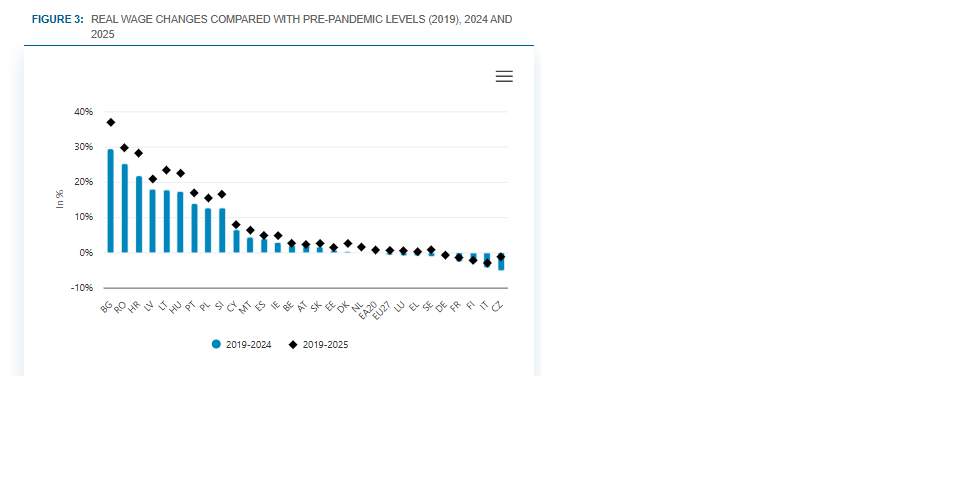The European labour market remains resilient, with unemployment at or near historic lows despite a slowdown in job creation. The European Commission’s new report, “Labour Market and Wages in Europe,” highlights improving job quality and progress on adequate wages, even as households continue to navigate lingering inflation and uneven productivity growth.
Employment growth cooled to 0.8% in 2024, from 1.2% in 2023, reflecting economic headwinds and geopolitical uncertainty. Even so, joblessness across the EU has stayed close to record lows.
Wages and purchasing power
Real wages rebounded by 2.7% in 2024, yet on average remain 0.7% below 2019 levels. The Commission links slower wage momentum to weak productivity gains, ongoing uncertainty and slightly looser labour markets. Minimum-wage hikes and targeted support helped low-paid workers, but many middle-income employees report growing difficulty affording basics, particularly in higher-income member states where real pay recovered only slowly through 2024.
Nominal pay rose fastest in 2024 where inflation remained elevated and labour markets tight: Romania (16.6%), Hungary (12.6%) and Poland (12.3%). In countries with lower inflation, wage growth was more moderate, roughly 3–5% in Cyprus, Denmark, France, Ireland, Italy, Spain and Sweden. Finland (1.8%), Luxembourg (2.2%) and Belgium (2.9%) recorded the weakest nominal increases. Cross-country gaps in wage growth narrowed markedly in 2024 and are expected to compress further in 2025.

Real wages: who’s ahead, who’s behind
Real wage recovery varied widely. The strongest 2024 gains were in Romania (10.2%), Poland (9.0%) and Hungary (8.7%), helped by decelerating inflation and robust nominal increases. Real pay growth lagged the EU average of 2.7% in Cyprus, Estonia, Finland, France, Italy, Ireland, Luxembourg, Slovakia, Spain and Sweden, and was negative in Belgium.
Compared with 2019, EU real wages in 2024 were still 0.7% lower on average. One third of member states now exceed pre-pandemic levels by more than 12%, 12-18% in Hungary, Lithuania, Latvia, Poland, Portugal and Slovenia, and above 20% in Bulgaria, Croatia and Romania. Another third show modest gains of under 7% (including Austria, Belgium, Cyprus, Denmark, Estonia, Ireland, Malta, Slovakia and Spain). Nine countries remain below 2019 levels, among them several large economies: Finland, France, Germany, Greece, the Netherlands and Sweden (all under –3%), and the Czech Republic and Italy (over –4%). The report cites weak growth and subdued productivity since the pandemic as key drags. For 2025, EU real wages are projected to edge 0.6% above 2019, but still trail pre-COVID levels in the Czech Republic, Germany, Italy, Finland and France.

Cyprus snapshot
In Cyprus, nominal wage growth in 2024 was in the 3–5% range. Real wages rose more slowly than the EU average in 2024, reflecting somewhat persistent inflation. Over a longer horizon, Cypriot real wages increased by 6.6% between 2019 and 2024, and by 7.9% by 2025.
Inequality, fairness and the middle-income squeeze
Low-paid workers’ situation has improved since the pandemic, and the incidence of in-work poverty has fallen. Yet middle-income households in many higher-income countries report greater difficulty affording essential goods and services, a reflection of price shocks and the fact that they often did not benefit from minimum-wage hikes or targeted government support.
Perceptions of fairness remain mixed. A 2022 Special Eurobarometer found 57% of respondents accept income differences as a way to reward talent and effort, but 37% felt people generally do not get what they deserve. Views of unfairness were strongest in Cyprus (65%), Greece (60%) and Slovenia (55%), and lowest in Luxembourg (18%), Denmark (25%) and Finland (26%).
Women and third-country nationals are more likely to remain in low-paid jobs. In 2023, women’s gross hourly earnings were on average 12.0% lower than men’s across the EU, down from 14.1% in 2019, with larger gaps at older ages and in the private sector. Persistence in low-pay (four or more years) ranged from under 2% in Finland, Denmark and Sweden to above 10% in Latvia, Estonia, Hungary, Malta, Cyprus, Portugal, Lithuania, Ireland and Bulgaria. Women are more likely than men to remain low-paid over time in most countries, with especially wide gaps in Cyprus, the Czech Republic, Estonia, Latvia, Lithuania and Malta. Low-pay persistence is generally higher among migrants than native-born workers.

Demographics, migration and labour supply
Shrinking domestic working-age populations in around ten member states, notably Slovakia (–4.4%), Poland (–5.4%), the Czech Republic (–4.8%), Bulgaria and Romania (about –3%), have been partly offset by inflows of non-EU nationals. In several countries, arrivals from both within the EU and beyond have helped counter ageing-related pressures, and in some cases, Germany, Austria, Portugal, Finland, Estonia, Cyprus and Malta, contributed to overall population growth.
Non-price competitiveness and productivity gains typically support higher wages, but do not always yield a more even wage distribution. The relationship varies by country. The report notes improved non-price competitiveness alongside reduced wage inequality in the Czech Republic, Cyprus, Estonia, Poland and Romania, while Malta and Bulgaria saw rising wage inequality despite competitiveness gains. In Greece, wage inequality fell even as non-price competitiveness weakened. Policy design remains crucial to ensure wage growth reflects productivity gains and is more evenly shared.
What the Commission says
“The European social and labour model is strong and adaptable. This report shows welcome progress on wages, but we cannot be complacent, we must do more to boost workers’ purchasing power to confront the cost-of-living crisis,” said Roxana Minzatu, Executive Vice-President for Social Rights and Skills, Quality Employment and Preparedness. “Minimum wages play an important role and point to concrete measures that can benefit workers, employers and the wider economy. We must continue to protect and invest in people, that is how we build a resilient Europe where everyone can share in economic progress.”
